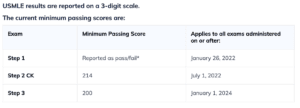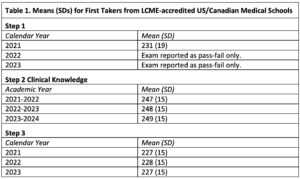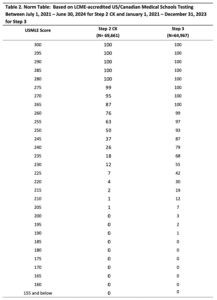USMLE Step 1, Step 2 CK, and Step 3 Score Percentiles
98692 Views
This blog was originally written by Dr. Michael Zobel in November 2022, and was updated for accuracy on June 9th, 2025, by Dr. Dylan Eiger.
When preparing for the USMLE exams, understanding your score percentile can be just as important as knowing your raw score. While Step 1 is now pass/fail, Step 2 CK and Step 3 remain numerically scored, and your percentile rank can significantly impact your residency and fellowship applications and long-term career goals. In this post, we will break down what your Step 2 CK and Step 3 scores mean in terms of percentiles, competitiveness, and future career prospects.
Understanding USMLE Score Percentiles
The USMLE uses a three-digit scoring system for Step 2 CK and Step 3, with a mean and standard deviation that change slightly each year. Minimum passing scores can be found below:
Your percentile rank reflects how your score compares to others who took the exam.
For example:
- A Step 2 CK score of 240 generally falls around the ~40th percentile, meaning you performed better than about half of test-takers.
- A Step 2 CK score of 260 places you in approximately the ~75th percentile, making you a top performer.
- A Step 3 score of 230 is around the ~50th percentile, while a Step 3 score of 240 is closer to the ~75th percentile.
Since residency and fellowship programs use Step 2 CK and Step 3 scores, respectively to evaluate applicants, it’s crucial to understand how your performance stacks up against others.
Step 1 is now a pass fail examination and the only data published on this examination now are the average score from 2021 (when it was last scored) as well as pass/fail rates.
Below are data on the mean and standard deviation of USMLE scores for Step 1, Step 2CK, and Step 3 from 2021 to 2024.
USMLE Step 2 CK Score Percentiles and Competitiveness
Step 2 CK is often considered the most important scored USMLE exam now that Step 1 is pass/fail. A strong Step 2 CK score can make up for a weak Step 1 performance (i.e. a low score or failing on your first attempt) and significantly impact your residency match chances.
Below are the most up to date percentile ranges for Step 2 CK and Step 3:
How Your Step 2 CK Score Affects Your Residency Application
- 265+ (Top 15%) – Highly competitive for nearly all specialties, including competitive fields like dermatology, plastic surgery, and orthopedic surgery.
- 260-264 (75th-90th percentile) – Very strong score for most residency programs, making you a competitive applicant.
- 250-259 (50th-75th percentile) – Solid score, but you may need other strong application components for highly competitive specialties.
- 240-249 (25th-50th percentile) – Still a comfortably passing score but could limit options for competitive programs.
- Below 230 (<10th percentile) – While a passing score, may require strategic planning, such as applying broadly and having a strong personal statement and letters of recommendation.
How a High Step 2 CK Score Helps Your Career
A strong Step 2 CK score can:
- Increase your chances of matching into competitive specialties like dermatology, orthopedic surgery, plastic surgery, or ophthalmology.
- Compensate for a weak Step 1 performance, particularly in programs that previously used Step 1 scores (if applicable) or failures as a screening tool.
- Improve your residency program options, giving you more flexibility in choosing location, prestige, and work-life balance.
- Boost your confidence and readiness for Step 3, since the knowledge base overlaps significantly between these two examinations.
USMLE Step 3 Score Percentiles and Their Importance
Step 3 is the final exam in the USMLE series and is required for medical licensure in the U.S. While it is not as critical for residency applications as Step 2 CK, it still plays a role in career progression, particularly for international medical graduates (IMGs) who often take Step 3 prior to residency application, and those applying for competitive fellowships. Some students may elect to take Step 3 after the fellowship Match if they already have a strong application while others will take it before the Match to demonstrate a mastery of clinical medicine.
Step 3 Score Percentiles and Competitiveness
- 240+ (Top 20-25%) – Excellent score; can strengthen fellowship applications.
- 230-239 (50th-80th percentile) – Above average; helps differentiate you if applying for competitive programs.
- 220-229 (30th-50th percentile) – A solid score, usually sufficient for most purposes like obtaining a job and matching into fellowship.
- 210-219 (10th-30th percentile) – Passing but may not stand out if applying for fellowship.
- Below 210 (<10th percentile) – Still passing, but lower scores may require explanation to fellowship programs or employers in some cases.
Does Step 3 Matter for Residency or Fellowship?
For most residency programs, Step 3 is not a major factor in ranking applicants. However, it does matter in certain situations:
- IMGs – Some programs require IMGs to pass Step 3 before residency begins for visa purposes or to demonstrate their clinical competence.
- Fellowship applications – Competitive fellowships may consider Step 3 scores, especially if you are applying from a less competitive residency program.
- State licensure requirements – Some states require Step 3 completion within a certain timeframe.
Personal Experiences with Step 2 CK and Step 3
When preparing for Step 2 CK, you should strive to obtain the highest score possible as this will be a crucial factor in your residency application. However, it is also important to consider how your score will compare to others in the field you are applying to. It can be worthwhile to see what average Step 2 CK scores are for your program of interest. It will be important for you to use UWorld or AMBOSS as your primary resource, supplementing with NBME practice exams to gauge my progress – more information on how to best prepare can be found at the following blogs that discuss strategies for Step 2 CK, books, guides for UWorld, or complete study plans.
One of the biggest lessons you can learn is the importance of test-taking strategies. Time management and endurance were just as critical as knowledge. During the exam, you will find that staying calm and trusting your preparation can help avoid second-guessing answers.
For Step 3, your approach should be slightly different. Since it is a two-day exam with a focus on clinical decision-making, it will be important to review the clinical material but also to prioritize CCS cases. We often recommend that students use UWorld or AMBOSS Step 3 question banks. The second day of the exam can be particularly challenging due to the sheer volume of CCS cases, but practicing with software simulations can help you manage time effectively.
Final Thoughts: What Your Percentile Means for Your Future
Your Step 2 CK and Step 3 scores are, for better or worse, more than just numbers—they can shape your residency, fellowship, and career prospects. While percentiles can give you an idea of where you stand, remember that a strong application includes more than just test scores. Clinical evaluations, research, leadership, letters of recommendation, and personal statements all play crucial roles in making you a well-rounded candidate.
If you’re aiming for a competitive specialty or program, focus on achieving a high Step 2 CK score to maximize your options. If you’re preparing for Step 3, use it as an opportunity to showcase your clinical reasoning skills and readiness for independent practice.
In the end, your USMLE scores are just one piece of the puzzle. Work hard, stay disciplined, and remember that every challenge you overcome brings you one step closer to your medical career goals.
Looking for In-Depth USMLE Discussions? Join Our Subreddit!
Navigating the changes in the USMLE landscape can be a crucial step in your medical education journey. Join our subreddit, r/ask_a_usmle_tutor, to connect with experienced MD tutors and fellow medical students. Here, you can discuss insights, ask questions, and gain valuable advice on topics ranging from score interpretation to exam strategies.
Join us now at r/ask_a_usmle_tutor and be part of a community that understands the challenges of the USMLE.
For more resources on the USMLE and personalized support, consider scheduling a complimentary consultation with one of our EMP education consultants!
Featured Articles



